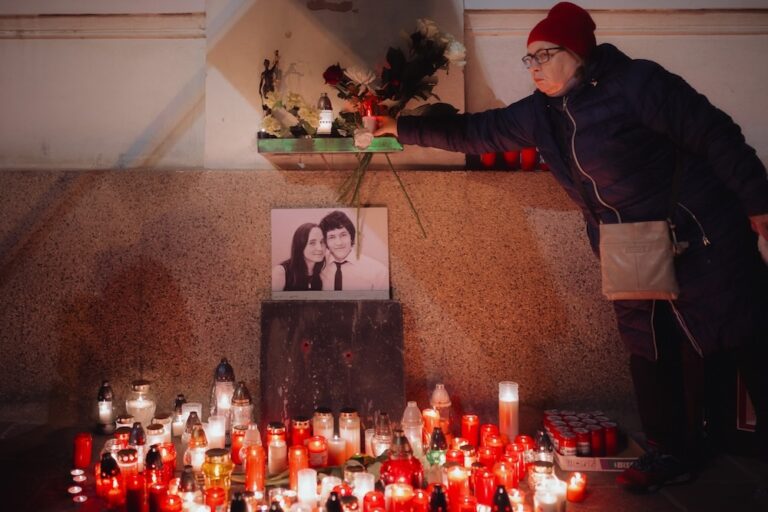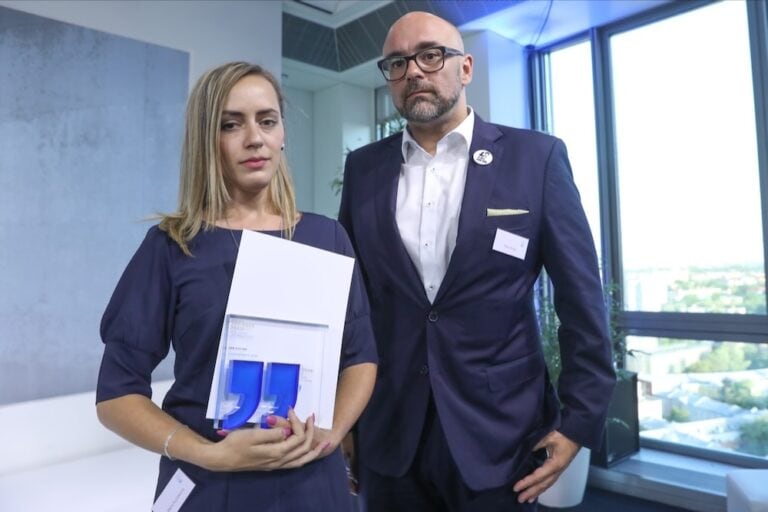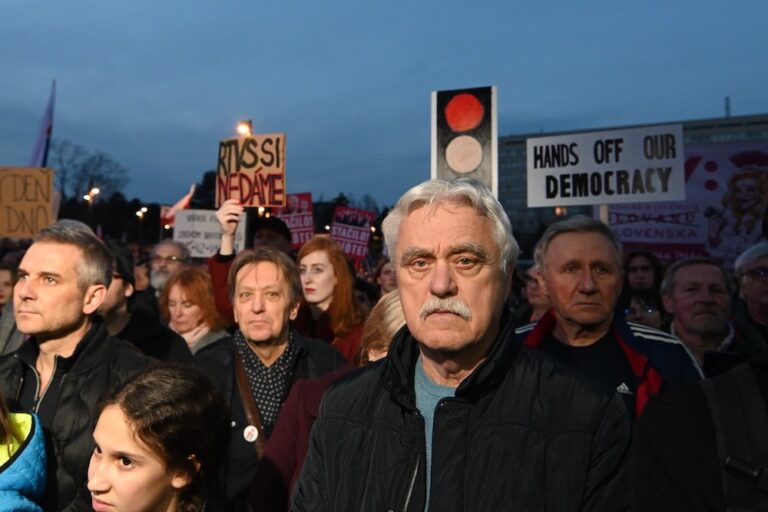(IPI/IFEX) – The following is an IPI letter to President Rudolf Schuster: H.E. Rudolf Schuster President Bratislava Slovak Republic Via Fax: + 421 7 544 17 532 Vienna, 5 July 2001 Your Excellency, The International Press Institute (IPI), the global network of editors and media executives, wishes to reiterate its concern over criminal charges brought […]
(IPI/IFEX) – The following is an IPI letter to President Rudolf Schuster:
H.E. Rudolf Schuster
President
Bratislava
Slovak Republic
Via Fax: + 421 7 544 17 532
Vienna, 5 July 2001
Your Excellency,
The International Press Institute (IPI), the global network of editors and media executives, wishes to reiterate its concern over criminal charges brought against a Slovak journalist; particularly in the light of recent comments made by one of Your Excellency’s advisors.
On 26 June, presidential aide Jan Bilek told the news agency SITA that the charges of criminal defamation brought against Slovak journalist Ales Kratky will not be dropped. SITA quoted Bilek as saying, “It would be good to let this lawsuit go through, even without a resolute conclusion; it could serve as a warning for others”.
Bilek was responding to a letter sent to Your Excellency on 25 June by IPI. In the letter, IPI expressed its concern over criminal charges brought against Kratky, a commentator with the daily Novy Cas, in response to a 26 May article entitled, “Chaos in the Head of State”, which was critical of Your Excellency’s state of the nation address.
IPI urged Your Excellency to withdraw the lawsuit against Kratky and emphasised that criminal defamation places a severe restriction on freedom of expression and, as a consequence, such legal provisions should be repealed. On 2 July, Bratislava’s regional prosecutor laid charges against Kratky.
While acknowledging reports that Your Excellency has expressed a willingness to withdraw the lawsuit but is unable to do so due to recent constitutional reforms, IPI is deeply perturbed at the sentiment contained in Bilek’s remarks. Regarding Bilek’s comment that the lawsuit could “serve as a warning for others”, it would appear that criminal defamation in this present case is merely being employed to deter others from expressing views contrary to those held by the government. Such an attitude displays a questionable appreciation of the role played by the legal system within a democracy.
Public debate, including caustic criticism, is a fundamental part of any democracy. In order to participate in the democratic process, it is essential that citizens have access to a plurality of information sources and a variety of opinions. The absence of criticism in public debate is the hallmark of authoritarian regimes. It is unacceptable that politicians allude to the possibility of using the legal system to stifle opposition. The impartiality of the legal system forms the foundation of democratic society. It is IPI’s belief that to make use of the courts to achieve political aims will not only erode the legal system itself but will have a detrimental effect on the progress made by the Slovak Republic in its transition process.
Bearing in mind these arguments, may we respectfully remind Your Excellency that the European Union (EU), to which the Slovak Republic has applied for membership, has set out certain criteria for states wishing to join. Among these criteria is the requirement that the candidate country achieve stable institutions guaranteeing democracy, the rule of law and human rights.
These prerequisites are further affirmed in the Amsterdam Treaty which states that the EU is “founded on the principles of liberty, democracy, respect for human rights and fundamental freedoms, and the rule of law”. These principles form the core of the EU’s political philosophy. As an applicant country to the EU, the Slovak government should give proper consideration to these principles.
Moreover, the Slovak Republic is a signatory to the European Convention on Human Rights in which Article 10 states, “Everyone has the right to freedom of expression. This right shall include freedom to hold opinions and to receive and impart information and ideas without interference by public authority and regardless of frontiers.” The case against Kratky and the apparent intention to use criminal defamation as an instrument to silence journalists critical of the government is in gross violation of this Article.
Therefore, we urge Your Excellency to take the necessary steps to ensure that criminal defamation and other legal provisions are not used against individuals critical of the authorities. This is not only a fundamental requirement in any democracy, but also vital within the context of the Slovak Republic’s accession to the EU.
While welcoming the recent amendment of Slovakia’s Constitution which intends to create self-regulation of Slovakia’s judiciary by setting up a new Judicial Council, IPI nonetheless wishes to reiterate its concern at Bilek’s remarks when viewed against the backdrop of past reports of political bias in the Slovak judiciary. In the European Commission’s 8 November 2000 report on Slovakia’s progress towards accession to the EU, it expressed concern at the impartiality of the Slovak judicial system and stated “serious efforts are needed, as a matter of priority, to guarantee its professional impartiality and political neutrality.”
Furthermore, IPI urges the relevant authorities to drop the case against Kratky and initiate the process of repealing criminal defamation from the statute books. Criminal defamation places unacceptable restrictions on freedom of expression as guaranteed by international law and has no place in a democracy. By repealing these legal provisions, the Slovak Republic will provide the international community with a positive example in a region where these laws are often used to violate freedom of expression.
Yours sincerely,
Johann P. Fritz
Director
Recommended Action
Similar appeals can be sent to:
H.E. Rudolf Schuster
President
Bratislava
Slovak Republic
Fax: + 421 7 544 17 532
Please copy appeals to the source if possible.
For further information, contact IPI at Spiegelgasse 2, A-1010 Vienna, Austria, tel: +43 1 512 90 11, fax: +43 1 512


